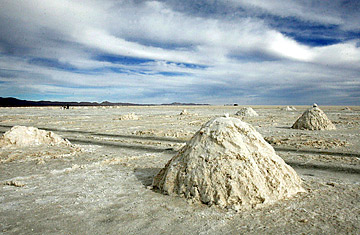
A Uyuni salt-land has an extension of 12,000 square kilometers of salt and at the same time is the biggest reserve of Lithium.
(2 of 2)
But Bolivia analyst Erasto Almedia of the political risk consulting firm Eurasia Group says automakers shouldn't panic. Morales may talk a big nationalist game, Almeida argues, but he always ends up accepting foreign investment and technological support that could give the car companies a foot in the lithium-production door. "The conditions exist for foreign investment and involvement in the lithium sector in Bolivia," Almeida contends, especially if Bolivia wants to expand beyond the initial pilot plant.
Saul Villegas, a director at the Bolivian Mining Corporation (COMIBOL), the operative wing of the Mining Ministry, seems to agree. "We know that we lack know-how and that we need investment to pull this off," says Villegas, pointing out that the government has formed a scientific committee made up of auto experts and representatives from car companies worldwide.
Foreign investors will have to be sensitive to Bolivian anger and resentment about the past, however. This is hardly the first time, for example, that Bolivia's Potosi region has been eyed by the outside world for its natural riches. During the colonial era, silver from the area's prodigious mines helped fund the Spanish empire. But historically, all that wealth has left the local population, especially the indigenous, with little more than desperate poverty and early death by mining-related diseases like black lung. Another concern is the environmental impact; but lithium mining, as observed in countries with deposits like Chile, Argentina and China, seems to be less hazardous than other kinds of mineral extraction. "Lithium could be one of the least contaminating mining processes," says Marco Octavio Rivera of Bolivia's Environmental Defense League, although he notes that prolonged exposure to lithium can cause nervous system disorders.
The relatively safe extraction process is also good news for the thousands of tourists who flock to Potosi each to see the Salar's sprawling white desert and sleep in a hotel made entirely of salt. Lithium is found in the water in the area, but instead of unsightly pipelines, the lithium-mining process will use hidden underground ones to siphon the water from below the Salar's surface to extract the lithium carbonate.
Either way, Morales' main concern is that a larger portion of the lithium profits remain at home to better the lives of people for whom electricity and paved roads are rare and electric cars non-existent. "We are very excited about the prospects," says Delia Alejo of the Southern Highland Regional Federation of Women Peasants, which represents the farmers of Rio Grande, near the pilot plant. "This is going to bring great development." It could if Americans are as serious as they say about trading in an old foreign energy supply for a new one.
